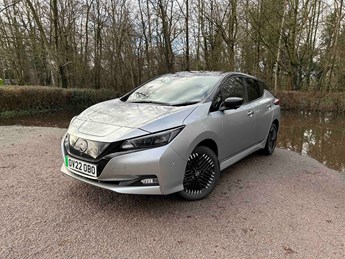We use cookies to ensure that we give you the best experience on our website. If you continue without changing your settings, we will assume that you are happy to receive all cookies on the Business Car website. However, if you would like to, you can change your cookies at any time

The start point for the best source of fleet information |
Model update: Nissan Leaf e+ Tekna
Date: 06 November 2023 | Author: Martyn Collins

|
|
||||||||||||||||||||
It must be said that 2011 was monumental for Nissan in the UK, with the launch of the original Nissan Leaf. Forty thousand found UK homes, before it was replaced by the second-gen version we have here in 2018.
Facelifted early last year, the changes made to our test car revolve around new colours and wheel options, like the black, 17in multi-spoke alloy wheels fitted to our range-topping Tekna.
It might have been on sale in this form for five years, but with these wheels, the duo-tone roof and darkened details keep the Leaf looking fairly current.
Inside, the tall driving position dates the Leaf, and some won't get on with it. Still, you do get a telescopically adjustable steering column which improves things. The tall dash is dominated by the modest 8in screen with the latest NissanConnect operating system controlling the infotainment - although the resolution isn't very sharp. More clever, is the fact that the NissanConnect app allows control of the various features of the Leaf via smartphone.
The instruments are an odd mix of analogue and digital, that are difficult to read at a glance and show the age of this EV. All Leaf models are well-equipped, but this range-topping Tekna also benefits from a welcome Bose stereo upgrade.
Front and rear space is generally excellent, although taller rear passengers will bemoan a lack of headroom, compared with rivals such as the Volkswagen ID.3. Boot space is excellent, with 435 litres, that expands to 1,176 litres with the split seat folded.
The 59kWh Leaf e+ we drove is the quickest Leaf with the longest range, with 0-62mph in 6.9sec, and the longest 239-mile range on a full charge. When it comes to charging, the Leaf will take 6.5 hours to get to 100% on a 7kW charger. It will also fast-charge at up to 50kW in about an hour - similar to rivals. The 59kWh e+ can also be charged at up to 100kW, equalling a quicker 10-80% charge time in just 35 minutes. Unfortunately, we've found out the 59kWh e+ model has been quietly dropped, due to an overlap with the bigger and newer Ariya. This means you can now only have the smaller 39kWh battery (for which we've provided cost figures here). This equals an eight-second 0-60mph time and a 168-mile range, which isn't enough when compared to rivals.
On the road, the Leaf is very easy to drive with precise steering and is generally a tidy handler. However, like bigger battery versions of the Cupra Born, the ride feels unnecessarily firm, although it's not helped with those new 17in wheels. Therefore, potholes and speed humps are far more noticeable than you'd expect. All-round visibility is generally good, although the thick rear pillars and small(ish) rear screen make you grateful for this Nissan's standard-fit rear camera.
One particularly likeable driving feature of the Leaf is the one-pedal driving feature called E-pedal. This is where the battery's energy recuperation system does most of the braking - so the Leaf pretty much stops itself as soon as you lift off the accelerator. You'll either like this feature or you won't. We found it useful around town where it keeps the drive particularly smooth. The harder ride is less noticeable at speed and, as you'd expect, the Leaf is an impressively hushed, refined companion with minimal road noise entering the cabin.
It is a shame Nissan have discontinued the 59kWh version of the Leaf, as its extra range made it a very useable EV on a budget. Still, the Ariya now fills that role. With the 39kWh battery, the Leaf only adds up for business users going shorter distances for an affordable price, as newer rivals make more sense.
Nissan Leaf e+ Tekna
P11D: £31,940
Residual value: 37.6%
Depreciation: £19,924
Fuel: £4,178
Service, maintenance and repair: £1,223
Cost per mile: 42.20p
Range: 168 miles
CO2 (BIK %): 0g/km (2%)
BIK 20/40% a month: £10/£21
Luggage capacity: 435 litres
Battery size/power: 39kWh/150hp
Verdict |
6/10 |
|||
 |
|
 |
|
|











